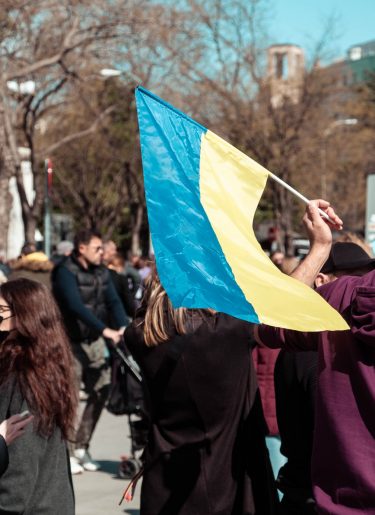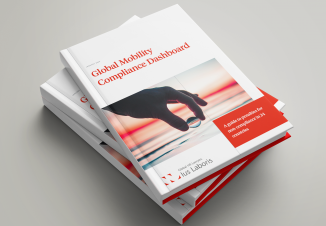
On 4 March 2022, the Council of the European Union activated temporary protection (under Council Directive 2001/55/EC of 20 July 2001) for Ukrainian citizens arriving in the EU as a result of the Russian invasion of Ukraine.
Temporary protection status allows Ukrainian nationals, fleeing from war, to get residence permits in the EU Member States without applying for refugee status and to have the right to work, study and receive medical and social help in the EU.
The following options are available for Ukrainians arriving in Lithuania for a legal stay:
To apply for national visa D or for a temporary residence permit, Ukrainian nationals must visit a registration centre with any personal document confirming their identity. Where necessary, the Lithuanian Migration Department can issue them with a new personal identity document (temporary foreign passport).
Ukrainians arriving in Lithuania are invited to register at the nearest Migration Department. Those who arrive in Lithuania and do not have place to stay are invited to the Registration Centres in Alytus (1B Pramones St.) and Marijampole (9 Parko St,) that are open around the clock.
Ukrainians arriving in Lithuania due to the war who has registered within Migration Department and have a biometric passport or national visa D or temporary residence permit do not need any additional documents or permits to start working in Lithuania.
Ukrainian citizens should pay attention to the important issues set out below during the onboarding procedure.
Contract
The employment contract forms the legal basis of cooperation between the employer and employee. According to the Lithuanian Labour Code, each employment contract must contain three indispensable terms: job function; conditions of remuneration; and workplace.
Employee information
Before the employee starts work, the employer must inform the employee, among other things, of the employer’s full name, code and registered office address, the place where the job will be performed, a description of the job function, employment start and end dates, annual leave entitlement, information on remuneration, duration of working day and working week.
Working time
According to Lithuanian legislation, the standard duration of the working week is 40 hours. Overtime must be compensated in addition to salary (i.e. the monthly or hourly salary agreed in the employment contract cannot include payment for overtime).
Annual leave
The minimum duration of annual leave is 20 working days for those who work five days per week and 24 working days for those who work six days per week.
Maternity leave
Pregnancy and childbirth leave duration is 70 days before and 56 days after childbirth (for complicated childbirth or multiple births, the duration of leave after childbirth is 70 days). Childcare leave may be granted if the employee chooses to take it for the period till the child reaches three years of age.
As of 1 January 2022, the minimum monthly salary in Lithuania is EUR 730 gross, while the minimum hourly wage amount is EUR 4.47 gross. It should be noted that the average monthly salary in Lithuania is EUR 1666.90 gross. Information about the average monthly salary in each company is considered public information and can be checked here.
Employment income in Lithuania is subject to personal income tax at the rate of 20%, if the income does not exceed 60 average salaries per year (EUR 90,246 in 2022), and 32% if the income exceeds 60 average salaries per year.
The social security insurance tax rate is 19.5%.
Unlike in Ukraine, the social security contribution in Lithuania is withheld from the amount of gross salary, in the same way as personal income tax. This means overall deductions from the gross salary are approximately 39.5%.
It is also important to consider that usually job offers and employment contracts indicate the gross amount of salary, i.e. the amount before deduction of taxes and social security contributions.
If the salary is up to EUR 1678, a part of it will be considered as non-taxable income. The non-taxable income is calculated according to the following formula:
NTI = 460 – 0.26* (earned monthly salary – minimum monthly salary).
Sometimes Lithuanian employers offer additional benefits to their employees, such as:
Bank account
In order to receive salary in Lithuania, Ukrainian nationals will have to open an account in a Lithuanian bank. Opening a bank account usually involves filling in anti-money laundering and ‘know your client’ questionnaires which may take some time. Under the legislation in force, banks must verify certain information about their potential clients, so the bank account is not opened immediately. For this reason, it may be easier to open the account in the same bank, where the employer has its account because the employer can verify the fact that an employee is indeed employed or provide any additional information to the bank, if required. However, employees can choose another bank as well. The most popular banks in Lithuania are Swedbank, Luminor, SEB, Danske Bank.
Usually, in order to open a bank account, it is necessary to provide a temporary residence permit, a valid passport, and an employment contract. The easier option is to open an account at an electronic money institution, such as Paysera or Revolut. These allow individuals to open an account remotely by uploading a photo of a valid ID.
Ukrainians who received a temporary residence permit for humanitarian reasons are entitled to social assistance in Lithuania. In particular, they are entitled to receive all child benefits (including child money, and foster care benefit for foster children), one-off accommodation support, compensation for a part of their rent, social benefits, and other social payments.
Every employee who works for a Lithuanian employer must be registered in the system of the State Social Security Insurance Board Fund. Where the individual works under an employment contract, it is the employer’s obligation to register the employee in this system.
Ukraine and Lithuania have signed the Agreement on Social Security, according to which social security contributions made by Ukrainian citizens during their work in Lithuania can be recognised by Ukraine and included into their Ukrainian pension record. For that purpose, individuals will have to submit the Certificate issued by the Lithuanian authorities to the Ukrainian Pension Fund, indicating the period of work and the amount of social security contributions made in Lithuania.
For Ukrainians, arriving in Lithuania following the war due to humanitarian reasons
Ukrainians who arrived in Lithuania due to humanitarian reasons are entitled to medical help in Lithuanian hospitals. During registration upon arrival, Ukrainians are provided with a registration card, indicating their personal code of electronic health history (ESI). This ESI code should be presented at the hospital or pharmacy to receive medical services and prescribed medicines.
For Ukrainians, who are employed with Lithuanian companies and arrived in Lithuania for non-humanitarian reasons
As described above, according to Lithuanian legislation, the employer is obliged to register the employee with social security and to withhold social security contributions from the employee’s salary.
Urgent medical aid is provided from the first day of registration. However, to be entitled to non-urgent medical help in Lithuanian state hospitals, the employee must pay social security contributions for at least three months. To be entitled to social security insurance with respect to maternity leave, social security contributions must be paid for at least twelve months.
Migration Department of Lithuania
Here you can find more detailed information on migration issues and procedure of obtaining documents.
State Labour Inspectorate of Lithuania
Useful information for Ukrainians on employment matters.
An organisation helping Ukrainians in migration and employment-related issues.
Charitable organisation, helping Ukrainians, arriving to Lithuania with accommodation, transportation.
For more information about foreign workers



